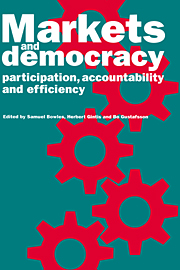Book contents
- Frontmatter
- Contents
- List of figures
- List of tables
- Preface
- 1 Post-Walrasian political economy
- Part I Agency, incentives, and democratic accountability
- Part II Institutions and institutional change
- Part III Conditions for the success of the democratic firm
- Part IV Productivity, distribution, and power
- Part V Ownership, participation and capital markets
- Part VI Political democracy and economic democracy
- Bibliography
- Author index
- Subject index
1 - Post-Walrasian political economy
Published online by Cambridge University Press: 05 March 2012
- Frontmatter
- Contents
- List of figures
- List of tables
- Preface
- 1 Post-Walrasian political economy
- Part I Agency, incentives, and democratic accountability
- Part II Institutions and institutional change
- Part III Conditions for the success of the democratic firm
- Part IV Productivity, distribution, and power
- Part V Ownership, participation and capital markets
- Part VI Political democracy and economic democracy
- Bibliography
- Author index
- Subject index
Summary
Introduction: new light on an old debate
What rules of the game render an economy participatory, fair, and democratically accountable without compromising efficiency and other valued social goals? The chapters in this volume explore this question from the vantage point of the revolution currently under way in microeconomic theory constituted by the abandonment of the simple world of Walrasian general equilibrium in favor of a richer world of imperfect information, incomplete markets, unenforceable contracts, costly transactions, and strategic interaction. In this new world people do not always do what they are supposed to do, nor do they always know all that they would like to know.
By the “Walrasian model” we mean the strand of neoclassical economics that proceeds from the assumptions that preferences are exogenously determined, contracts are exogenously enforced, and economic agents have infinite information-processing capacity (Arrow and Debreu, 1954). Post-Walrasian economics, as we will see in this Introduction, departs from one or more of these assumptions, asserting instead the implications of bounded rationality (Heiner, Chapter 5 in this volume), the importance of incomplete or incompletely enforceable contracts and the social origin of tastes, values, and commitments.
These new developments in microeconomic theory provide the basis for a rethinking of the old debate that pits economic planning against the market. Post-Walrasian microeconomic theory also allows us to add an essential missing term to the economists' “socialism versus capitalism” debate: namely, democracy (Weitzman, Chapter 18 in this volume). The last great round of this debate took place during the 1930s, with Oscar Lange and other advocates of socialist planning contesting the claims of Friedrich Hayek and other advocates of capitalist market allocations (Hayek, 1935; Lange and Taylor, 1938).
- Type
- Chapter
- Information
- Markets and DemocracyParticipation, Accountability and Efficiency, pp. 1 - 10Publisher: Cambridge University PressPrint publication year: 1993
- 6
- Cited by



